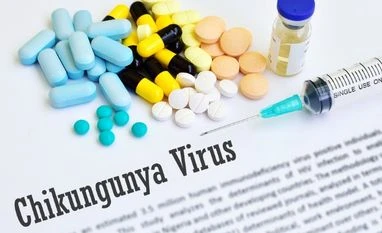US approves 1st vaccine against chikungunya virus: All you need to know
Symptoms of chikungunya can sometimes last for months or even years, but the virus is rarely fatal
)
Photo: Shutterstock
Listen to This Article
The US Food and Drug Administration (FDA) announced on Thursday that it has approved the first vaccine to prevent disease caused by the chikungunya virus.
The single-dose vaccine, Ixchiq, made by Valneva Austria GmbH, is approved for people over 18 years and over who are at a greater risk of exposure to the virus. Ixchiq was granted fast-track and breakthrough therapy designations.
What is chikungunya?
Chikungunya, a mosquito-borne disease whose name in the Makonde dialect of Africa means "bending over in pain," has no specific treatment and can be debilitating and even deadly for newborns.
Health experts consider it to be an emerging threat to global health made worse by climate change, with at least five million cases in the past 15 years, although deaths and severe illness are rare, according to the World Health Organization (WHO).
People most at risk of infection live in Africa, Southeast Asia and parts of the Americas, where chikungunya-carrying mosquitoes are endemic, but the climate crisis has spread the virus to new parts of the world.
Also Read
Before 2006, the virus was rarely identified even in US travellers, said the US Centers for Disease Control and Prevention (CDC), adding that studies identified a couple of dozen cases in US travellers between 2006 and 2013. In late 2014, cases of local transmission were reported in warmer parts of the US, including Florida, Texas, Puerto Rico and the US Virgin Islands.
Symptoms of chikungunya
People who get sick with chikungunya typically have a fever and can develop joint pain. In addition, they may also experience headaches, muscle pain and rashes. For some, the joint pain can be excruciating, and it can continue for years. Chikungunya can be a potentially deadly threat to newborns.
Symptoms of chikungunya can sometimes last for months or even years, but the virus is rarely fatal.
'Vaccine best option for people vulnerable to the virus'
Ixchiq contains a live, weakened version of the chikungunya virus, so it may cause symptoms that are similar to an infection.
The FDA said that in one study, the vaccine virus was detected in people's blood in the first few weeks after they were vaccinated. The prescribing information that comes with the vaccine carries a warning to ensure healthcare providers inform their patients that it is unknown whether the vaccine virus can be transmitted from a pregnant person to their newborn, and it is not clear whether the vaccine virus can hurt a newborn.
Because there is no specific treatment for chikungunya, doctors often advise patients to rest, drink plenty of fluids and take over-the-counter medication to manage their fever or pain. However, scientists believe that a vaccine is the best option for people who are susceptible to the virus.
"Infection with chikungunya virus can lead to severe disease and prolonged health problems, particularly for older adults and individuals with underlying medical conditions," said Dr Peter Marks, director of the FDA's Center for Biologics Evaluation and Research, in a statement from the agency.
"Today's approval addresses an unmet medical need and is an important advancement in the prevention of a potentially debilitating disease with limited treatment options," he added.
Side effects of the vaccine
The FDA has asked that vaccine maker Valneva do a postmarket study to ensure that there are no serious risks to the vaccine.
The most common side effects reported in studies submitted to the FDA for the vaccine's approval included headache, muscle and joint pain, fever, tenderness at the injection site and fatigue.
Nearly 2 per cent of those who got the vaccine had severe chikungunya-like adverse reactions that required medical intervention. Only two of the nearly 3,500 people in the trials had to go to a hospital because of the reaction. Some people also experienced chikungunya-like adverse reactions that lasted at least 30 days.
(With agency input)
More From This Section
Don't miss the most important news and views of the day. Get them on our Telegram channel
First Published: Nov 10 2023 | 2:25 PM IST


